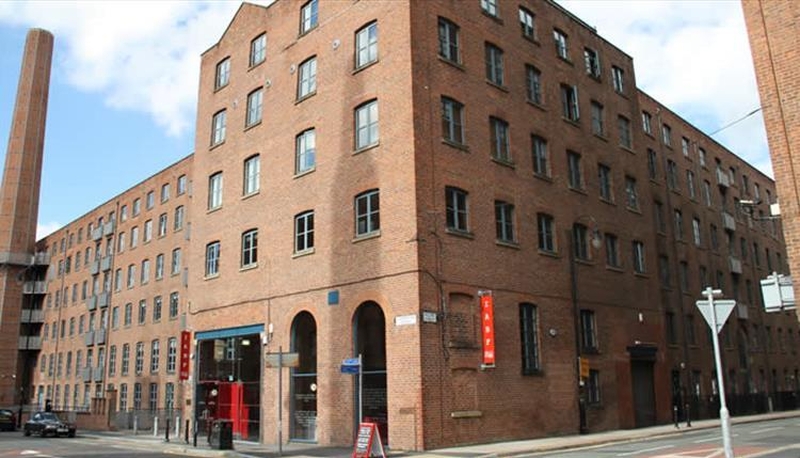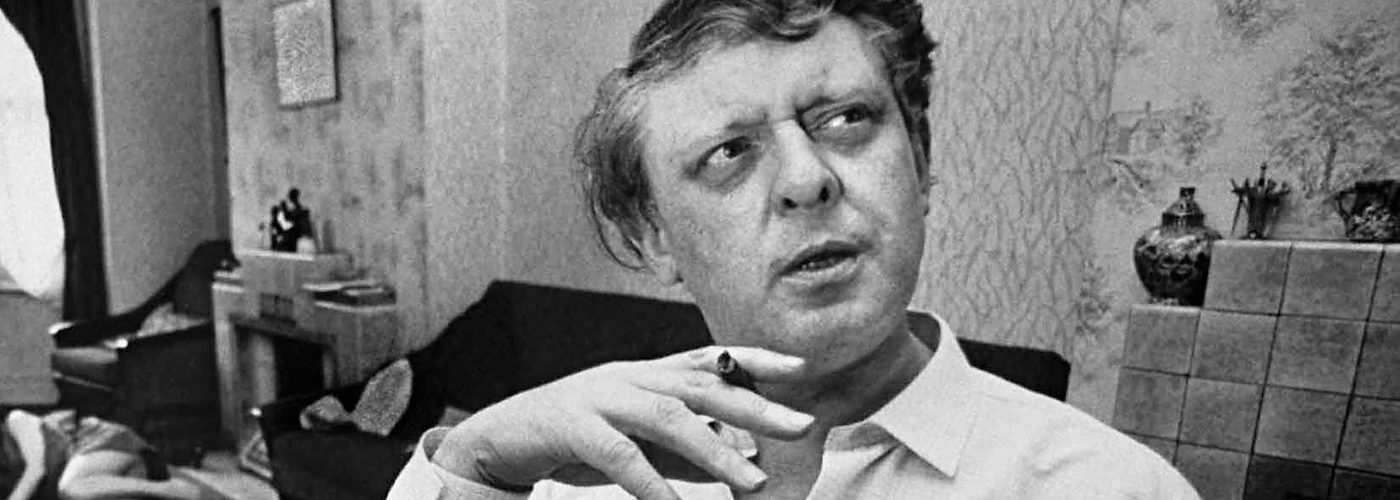Dr Graham Foster looks at the Manchester writer’s contribution on his 100th anniversary
2017 marks the centenary of Anthony Burgess, one of the most prolific novelists and composers of the twentieth century. He is most famous for his 1962 novel, A Clockwork Orange, though Burgess wrote 33 novels, 25 non-fiction books and over 250 pieces of original music.
Anthony Burgess was born John Burgess Wilson in Harpurhey, Manchester on 25 February 1917. In his autobiography Little Wilson and Big God (1987), Burgess claims that his parents were fixtures of Manchester’s music-hall scene; his father Joseph Wilson a pianoplayer for the silent cinemas, his mother Elizabeth a ‘soubrette’ (a professional singer and dancer) who went by the name ‘The Beautiful Belle Burgess’. This family life was to come to an abrupt end shortly before Burgess’s second birthday, when his mother and older sister, Muriel, died from influenza within days of each other. In 1922, Joseph remarried, and took his son to live with his new stepmother above the Golden Eagle pub in Miles Platting.
Burgess was schooled at the Roman Catholic Xaverian College in Manchester, which at the time was run by the Xaverian Brothers, a teaching order whose members took vows of poverty, chastity and obedience. It was at Xaverian that Burgess was introduced to his great literary influence, James Joyce and, even though he rejected the Catholic faith at the age of sixteen, his experiences at Xaverian inspired much of his work (particularly the opening chapters of Tremor of Intent (1966)). From here, Burgess went to Manchester University to study literature. This is where he met his first wife, Llewela ‘Lynne’ Jones. He eventually left Manchester in 1940 when he was called into service during the Second World War.

During his life, Burgess lived in places as varied as Gibraltar, Malaya, Brunei, France, Italy, Malta and Monaco, but he maintained a special connection to Manchester. He writes, ‘I am a proud Mancunian. I have, after a struggle with a people given to linguistic conservatism, even succeeded in importing the epithet mancuniense into the Italian language’. His roots away from the establishment in London were important to him, particularly as he was able to compare himself to William Shakespeare, another conqueror of literary London who emerged in the provinces and managed to avoid an Oxbridge education. Even in foreign climes, Burgess was compelled to compare to Manchester. His visit to Leningrad in 1961 brought memories of his childhood: ‘I think it was the sense of the architecture, the rather broken-down architecture of Leningrad, the sense of large numbers of the working class, rather shabbily dressed. And I suppose in some ways the smell of Manchester – I always associated Manchester with the smell of tanneries, very pungent smells, as you know. I got the same smell out of Leningrad. It’s a small thing, but these small things have a curious habit of becoming important’.
Burgess’s experiences of Manchester are apparent in much of his work, particularly the novels One Hand Clapping (1961), Tremor of Intent, The Pianoplayers (1986) and Any Old Iron (1988). In 1989, Burgess wrote The Manchester Overture, a symphonic piece celebrating his home city, which was not performed there until its European premiere in 2012.
Burgess’s centenary in 2017 provides the opportunity to rethink his contribution to British culture, and to consider the impact that his work has had on subsequent writers, filmmakers, musicians and artists. As part of the celebrations, the first volumes of a complete edition of Burgess’s novels will be published, bringing back into print titles that have been unavailable for many years. These will be published by Manchester University Press, under the collective title The Irwell Edition of the Works of Anthony Burgess (named, by Burgess, after the river that separates Salford and Manchester). The first volumes of these books will be launched at a three-day conference that will discuss Burgess’s life, work and reputation. The conference will be held at the International Anthony Burgess Foundation in Manchester on 3-5 July 2017.
‘I am a proud Mancunian. I have, after a struggle with a people given to linguistic conservatism, even succeeded in importing the epithet mancuniense into the Italian language’
The Burgess Foundation has planned an international programme of events to celebrate Burgess’s life and work, including, in February 2017, a new performance of Burgess’s version of Oedipus the King on BBC Radio 3, starring Christopher Eccleston and Fiona Shaw. The BBC Philharmonic will also perform a concert of Burgess’s music.
In collaboration with Thornbridge Brewery, the Burgess Foundation has developed a craft ale to mark the centenary. The Pianoplayers, a refreshing American Pale Ale, is named after Burgess’s novel about the music halls and silent cinemas of Manchester. The beer is available in the Burgess Foundation café and at retailers worldwide. A new edition of the novel will be published later in 2017 part of The Irwell Edition.
Full details of the centenary can be found on the Burgess Foundation’s website: www.anthonyburgess.org. These celebrations will reaffirm Burgess’s position as one of the most important British writers of the twentieth century.












